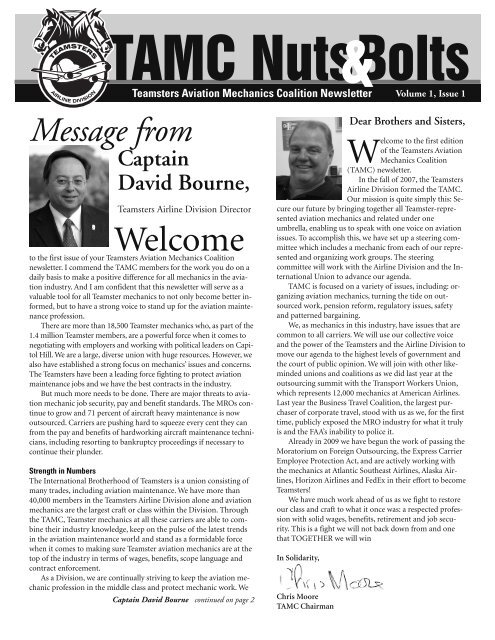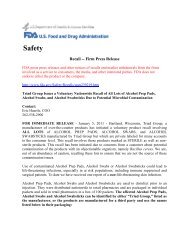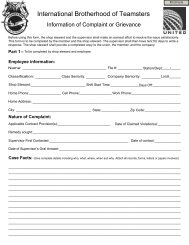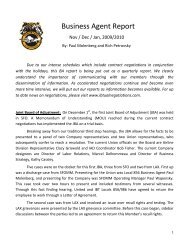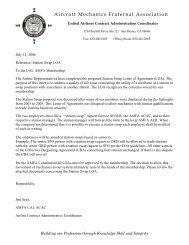TAMC NutsBolts - Teamsters SFO
TAMC NutsBolts - Teamsters SFO
TAMC NutsBolts - Teamsters SFO
Create successful ePaper yourself
Turn your PDF publications into a flip-book with our unique Google optimized e-Paper software.
<strong>Teamsters</strong> Aviation Mechanics Coalition Newsletter3Mechanics at United Have Come a Long WayBy Dave Saucedo, UAL, AMT SeattleIt is hard to realize where we are now withoutfirst taking a look back at where westarted from. This is our third and hopefullyfinal chapter in gaining representation from an organizationwith the capacity to effectively represent us mechanics for theprofessional group that we are.There are very few of us in maintenance who did not formsome type of relationship with that first union that molded ourcollective bargaining agreement. The one opinion we all share:change was needed. For some, the name change and slight policychange from IAM District 141 to District 141-M, was just too little,too late.We all wanted real change, from top to bottom, and not justthe window dressing that was provided. AMFA promised thatand built a new road from new grass roots members who tookstock in what it was to be a union member—some for the firsttime. The AMFA push was responsible for involving a considerablenumber of new faces to the idea of organized labor, andmany of those new activists have stayed on to make up some ofthe talented energetic leaders we have today.Sadly, through no fault of the many who tried to make thissingle craft concept work, the fraternal organization proved itcould not keep up with both the promises made, and demands ofus mechanics, who still deserved more. We asked for more andwhat we finally understood was that this second union only offeredmore of the same: The same contract, the same delays resolvingissues, the same insecurities about our future, the samelack of respect.What we needed was a complete overhaul to the manner inwhich we conducted business with management, and we neededthe influence and reputation of a group that would help us obtainthe respect we long ago earned. We wanted real and permanentchange. We called on, and in April 2008, were ratified asmembers of the International Brotherhood of <strong>Teamsters</strong>.Sometimes we need an outsider’s view to point out ourstrengths and warn us of our weaknesses. The <strong>Teamsters</strong> havestepped into that role with patience and resolve but made us realizebefore we can make a run, we first need to learn to crawl.We spent much of the first part of our first year doing exactlythat. We formed our leadership and organized offices and groups.We played on those strengths pointed out through <strong>Teamsters</strong>guidance and formed committees. We formed new ground andflight safety committees and we re-establish the Outside VendorFarm-Out Committee. We have formed new communicationchannels including web and blog sites to help better the exchangebetween the members and union leadership. We worked hardthrough San Francisco and Chicago to restore our MSAP program.We have worked at individual stations to save jobs andkeep the work force we have, making big wins along the way. Weworked with our business agents to finally bring resolution tomany outstanding and over dated grievances, despite the shortfallsof our contract. Some of the work has been slow and someissues still need that yet to be negotiated push of contractual language,but steadily progress is being made.Not everything was a slow crawl in the beginning, especiallywhen the <strong>Teamsters</strong> were “let loose” on our behalf to show uswhat they can do. A first sample of what is more to come camein the showing of tact, grace and ultimate leadership at the UALannual stockholder meeting, held just a few short months afterthe <strong>Teamsters</strong> became our bargaining agent.A team of Teamster representatives showed up to the meetingvery prepared, professional and ready to dominate the meeting.And they did. United CEO Glen Tilton himself later expressedrespect and even a bit of trepidation for this new union he wouldbe forced to deal with. The pilots groups, too, were astounded bythe Teamster performance and have since taken steps to restoreclose relations with mechanics.In fact, eight months before becoming <strong>Teamsters</strong>, August2007, Tilton proposed the sale of UAL's maintenance division, includingits heavy maintenance base in San Francisco, which employsmore than 4,000 mechanics. Shortly thereafter, UAL alsoannounced plans to sell off its profitable Mileage Plus frequentflier program.It was the <strong>Teamsters</strong> who publicly and loudly came to our aid,causing dozens of news publications to run tag lines such as aquote from James P. Hoffa who loudly proclaimed, “It’s time torun UAL like company, not a tag sale!” The <strong>Teamsters</strong> led organizedcampaigns at various airports in November by United Airlinemechanics and supporters who leafleted airports nationwide.They asked passengers to sign a petition urging United Airlines topull back from its plans to sell off its Mileage Plus program andits San Francisco aircraft maintenance operation, and causedpublic outcry and unwanted attention. Eventually, both plannedsales were scrubbed.But still the <strong>Teamsters</strong> pushed on, calling for lawmakers inWashington, D.C. to look into the Mileage Plus deal, courageouslyexplaining and bringing to light that UAL employees, thePBGC and the American taxpayers have a right to know if thelargest corporate pension default in U.S. history was orchestratedusing misleading information or could have been avoided entirely—questionsUAL would rather not have answered.The <strong>Teamsters</strong> union stood up for us again in February of2008, still two moths before being ratified as our bargainingagent, when they announced it would oppose a merger betweenUnited Airlines and Continental Airlines unless such a deal benefitsworkers at both airlines.UAL began to take a second look at with renewed esteem atjust who these new <strong>Teamsters</strong> mechanics were and how we conductedourselves. This was never more evident than in August2008 when an invitation was accepted by senior members ofA Long Way continued on page 4
<strong>Teamsters</strong> Aviation Mechanics Coalition Newsletter4A Long Way continued from page 3United management to the Teamster flag raising ceremony at theSan Francisco Maintenance base. This occasion marked the firsttime in time in many years that a union flag was flown on UnitedAirlines property. The event was attended by well over 300United mechanics and several leaders from the <strong>Teamsters</strong> including<strong>Teamsters</strong> Vice President of the Western Region Chuck Mackand Director of the Airline Division, David Bourne.This bold stance by the <strong>Teamsters</strong> has had a profound impacton the way UAL is now doing business with its mechanics. GlenTilton patiently waited for a meeting with David Bourne to discussthe future and positive new relationship between the mechanicsand UAL top management. It was this meeting that ledto talks between UAL and a small contingent of Teamster representativesincluding chief stewards Larry Calhoun and JockCreach, which helped in decreasing the numbers of mechanicswho were to be furloughed after United announced the groundingof its entire fleet of 737s. These talks also eventually led tothe halting of plans to completely close the line maintenance operationsat LGA airport at the New York point, effectively savingmechanics jobs.Most recently, these same types of high level talks and willingnessby United to cooperate rather than dictate have helpedto mitigate the number of mechanics now affected by the plansto reduce costs to the ground support and equipment functionsacross the system. Because of direct involvement of the <strong>Teamsters</strong>and representative members from affected stations, evenwith the absence of contractual language, we were able to mitigateclosures of stations and loss of some jobs. We did take somecuts, but were able to do so without surrendering any of our existingcontract language.It is the strength of the Teamster contracts that defines themfrom any other union. In the attempt to get us on our feet, the<strong>Teamsters</strong> called on the experience and talent of Teamster AirlineRep and negotiator Clacy Griswald to bring about the neededchange. Clacy organized members from all areas of maintenanceinto a steering committee in order to best represent the issuesfrom the floor. It is from this committee, that thirteen memberswere picked to represent the mechanic workforce in the SectionSix bargaining negotiations with United Airlines.Chief among issues beyond financial is the need to updateand have greater control over our scope clause and grievanceprocedures, both of which will add security to our ranks. Butrather than just change a few words or meanings, through the adviceof our Teamster leaders, the steering committee chose insteadto re-write and shore up several trouble spots to ourcontract. This took some time to come to a consensus; however,we are confident that the changes made will be the benefit andstrength we need for future battles to secure our futureThomas Jefferson once wrote, “When you cease to change,you cease to exist.” But change needs to be done carefully andmethodically, never rushed or poorly planned, and when possible,helped along through experience and might of a power thatcan truly help.We have celebrated our first year as <strong>Teamsters</strong>, and are nowlearning to walk. The process at times is indeed slow and thereare issues or growing pains that are yet to be resolved, but trueprogress is that which is done with patience. We rushed in towhat we thought was change twice before, only to find ourselvesrunning in those same lost circles. We have accomplished, andgrown a lot in a year.This time we will march unified with other Teamster aviationmaintenance professionals who share our common beliefs andgoals for a more secure and lucrative future.Another Message from <strong>TAMC</strong> Chair Chris MooreThere is a lot to report to you and I wanted to make you aware ofmy new assignment. Teamster carriers represent 18,500 mechanics.The <strong>TAMC</strong> has been active on a variety of aviation mechanic issues,most importantly on the fight to stop outsourcing practices.A few months ago I was asked by the <strong>Teamsters</strong> Airline Divisionto begin a review of our Teamster activities at UAL. The divisionleadership felt that after a year of representation at UALthis was a responsible course of action. I am writing you today tolet you know that I have already scheduled travel to your threelargest stations Chicago, Denver and San Francisco and will soonbe scheduling trips to other locations. My assignment is to meetwith as many of our members as possible to assess what we aredoing right, what we are doing wrong and what we need to do tomove forward. Our goals are to build the strongest possibleunion at UAL and win the strongest possible contract.I will also be discussing other <strong>TAMC</strong> priorities such as ourforeign outsourcing battle. This issue is one of the <strong>Teamsters</strong>highest priorities on Capitol Hill. We will relentlessly fight to gainground on this issue and get legislation passed that will protectour craft and industry from these outsourcing practices.I hope that you will take the time to talk with me in a full andfrank manner while I am at your base. You can also reach me byphone or e-mail at 202-409-6038 and cjm91@sbcglobal.net.The first bargaining session for your first Teamster contracttook place on April 28. We have very important goals in thesenegotiations including:• Improving to your retirement security (by negotiating amulti-employer defining benefit pension plan);Another Message continued on page 5
<strong>Teamsters</strong> Aviation Mechanics Coalition Newsletter5Another Messagecontinued from page 4• Tightening and improving the weak scope (job protection)language; and• Developing a more efficient grievance procedure that preventsthe company from delaying grievances.Given the importance of your bargaining, I hope to get yourthoughts on the system-wide contract campaign we are puttingtogether. Please consider voicing your opinions on 1) the bestway to get rank-and-file participation in the campaign, 2) thesort of contract campaign communication vehicles should we setup and 3) activities that will best get management’s attention in aconstructive manner.We, the <strong>Teamsters</strong> Airline Division and the <strong>TAMC</strong>, are committedto being the union of choice for all aviation mechanicsand related. United is only the first stop as we move forward withour plan to assess our strengths and weakness at all of the airlineswe represent in order to better serve our members.Sincerely,Chris MooreChair, <strong>TAMC</strong>Negotiating Update:Negotiating Strong Contracts to Secure Strong FuturesThe <strong>Teamsters</strong> Union is working hard each and every day to giveour members the support and respect they deserve. Much of thatsupport and respect comes in the form of negotiating and securingstrong contracts that raise wages, better working conditions,secure decent benefits and provide job stability for our membersand their families. Contract negotiations in the airline industryare currently on-going at the following companies:Continental AirlinesA negotiating committee comprisedof business agents andrank-and-file members from NewJersey, Florida, Ohio, Texas, California,Hawaii and Massachusettsbegan negotiations with ContinentalAirlines in December. Sincethe first meeting, the ContinentalNegotiation Committee has hadseven sessions with the companyand is focusing on securing betterwages and benefits for Continentalmechanics. The committee is alsolooking to tighten scope languageand will soon be discussing pension matters.Piedmont AirlinesNegotiations are to commence this week in Harrisburg, Pennsylvania.The membership voted down by a two-to-one margin thecompany’s best, last and final offer. <strong>Teamsters</strong> Airline DivisionDirector David Bourne and airline attorney Ed Gleason will beassisting in negotiations. Business agents are also meeting withmechanics from Virginia, North Carolina, Maryland, Pennsylvaniaand New York for more information.United AirlinesA steering committee comprised of representatives from aroundthe country, including Hawaii, Washington, Oregon, California,Illinois, Virginia and New York, met in January and February andto prepare Section 6 notifications.The Section 6 notifications were sentout March 10 and bargaining willcommence on April 28 in Chicago.United mechanics are looking torewrite contract language, secure decentwages and benefits that matchindustry standards, tighten scopelanguage and acquire a respectableand dignified pension plan.ExpressJetA Section 6 notice to reopen thecontract for collective bargainingwas recently sent out. ExpressJet localsare sending proposals out to their membership and arepreparing for upcoming collective bargaining.UPSThe division is meeting with the federal mediator on May 21 topush the negotiations forward and we are hopeful that this meetingwith produce a positive outcome.
<strong>Teamsters</strong> Aviation Mechanics Coalition Newsletter6Hopeis on theHorizonBy Rich Chase, Horizon MechanicMechanics and related at Horizon Air, based in Portland,Oregon, were looking for a real union with real power.On April 20, 2009, our search was over when the NationalMediation Board announced that 57 percent of those whovoted voted for Teamster representation. We successfully chosethe <strong>Teamsters</strong> over AMFA.Horizon Air Mechanicsand Related Choose <strong>Teamsters</strong>More than 89 percent of 484 eligible workers cast votes, provingthat workers at Horizon were looking for and are ready for apositive change.Our organizing committee members worked hard to makethe change happen. We were, of course, backed by the <strong>Teamsters</strong>.During our six-month-long organizing campaign, the <strong>Teamsters</strong>proved that they have the credibility, strength and resources toproperly represent mechanics and related at Horizon.Many of us were not satisfied with AMFA. We had issues withpoor representation, weak contract language and pay. The strawthat broke the camel’s back, however, was the fact that AMFA ignoredour concerns about outsourcing. The association oftenlooked the other way when stations were outsourced at our sistercompany, Alaska Airlines. If outsourcing ever comes to Horizon,we want a union that will fight for us, our jobs and our families.Throughout our campaign, the <strong>Teamsters</strong> worked hard tofight outsourcing and even invited Ryan Hurley, a member of ourorganizing committee, to the sixth annual <strong>Teamsters</strong> OrganizingConference in Washington, D.C. During the conference, Hurleygot a taste of what it’s like to be a Teamster and was given the opportunityto speak with Congressional leaders about the dangersof outsourcing. Along with members of the <strong>TAMC</strong>, Hurley lobbiedCongress to pass an outsourcing moratorium.Now that we are represented by the <strong>Teamsters</strong>, we look forwardto a strong contract with strong scope language, adequaterepresentation and a reputation that is second-to-none. We alsolook forward to being members of and working with the <strong>TAMC</strong>in their efforts to fight outsourcing. As we learned during our organizingcampaign, our solidarity is our strength. We are theunion. We are the <strong>Teamsters</strong>!<strong>TAMC</strong> Tells Washington‘We Are Serious’Aviation Mechanics Lobby CongressThe <strong>Teamsters</strong> have made fighting outsourcing a top priority andthey mean business.Over the past year, the Teamster Aviation Mechanic Coalition(<strong>TAMC</strong>), in conjunction with the <strong>Teamsters</strong> Airline Division andthe union as a whole, has fought hard to protect American jobs.From their 2007 outsourcing summit to their participation at the7th annual Aircraft Maintenance Outsourcing Conference of theAmericas and their groundbreaking report on outsourcing titled,“Who is Really Fixing Our Airplanes? An Expose of the 11,000Missing United Airlines Mechanics,” the <strong>TAMC</strong> has been hard atwork to protect our mechanic craft and class from both foreignand domestic outsourcing. They are committed to protecting theflying public from the hazards of outsourced aircraft maintenance.Outsourcing MoratoriumIt is the goal of the <strong>TAMC</strong> and the <strong>Teamsters</strong> Airline Division tosee anti-outsourcing legislation passed by Congress that wouldenact a moratorium on outsourcing. To get this done, the <strong>TAMC</strong>and David Bourne, Director of the <strong>Teamsters</strong> Airline Division,have made their presence of Capitol Hill known, holding over180 meetings with key political leaders.Most recently, in an effort to prove how much of a problemoutsourcing has become, members of the <strong>TAMC</strong>—led by <strong>TAMC</strong>Chair Chris Moore—went to Capitol Hill last month where theyvisited with Congressional teams about outsourcing maintenanceto third-party and overseas vendors. <strong>TAMC</strong> members who tookpart in the day’s events included Dave Saucedo(UAL), RalphSalzano (CAL), Ed Smith (Piedmont), Bob Combine (UPS Aviation),Gary Young (UAL), Bob Friend (UPS), John Atkinson (Air-Tran), Cedric Washington (ExpressJet), Joe Gonzalez(Continental), John Vasquez (ExpressJet), Scott Williams (ABX),Kevin Zunker (UAL), Bret Alexander (FedEx Express) and RafaelGarcia (FedEx Express).<strong>TAMC</strong> members, told Congressional and Legislative stafftheir own personal stories about how outsourcing has affectedthem. From finding broken parts on airplanes to seeing jobs slipaway, <strong>TAMC</strong> mechanics drove home the point that any way youlook at it, outsourcing is a raw deal.“The <strong>TAMC</strong> is serious about passing this important legislationand we want politicians in Washington to know just how serious wereally are,” Moore said.“The <strong>Teamsters</strong> Union and the <strong>TAMC</strong> arecommitted to fighting outsourcing and we’re not going to backdown until the job is done. By having aviation mechanics tell theirstories, we were able to put a face on this enormous problem.”We are Serious continued on page 7
<strong>Teamsters</strong> Aviation Mechanics Coalition Newsletter7We are Serious continued from page 6Political SupportDuring their time on Capitol Hill, Moore and other aviation mechanicsencouraged representatives to join the <strong>Teamsters</strong> and the<strong>TAMC</strong> in their fight against outsourcing.As Moore explained, the issue of outsourcing goes beyondprotecting American jobs. It also encompasses safety and nationalsecurity issues.“We as airline mechanics see the industry from the inside outand we want everyone to know what’s going on,” Moore said. “Wewant everyone to be held to the same standard and we want anyonewho is flying to be 100 percent safe.”In all, members of the <strong>TAMC</strong> met with staff from the officesof 24 representatives, including members of the Transportationand Infrastructure Committee, Education and Labor Committeeand Aviation Subcommittee. Those who the <strong>TAMC</strong> had meetingswith include staffers for Sen. Jeff Merkley (D-OR), Sen. RonWyden (D-OR), Rep. Jason Altmire (D-PA), Rep. Mario Diaz-Balart (R-FL), Sen. Sherrod Brown (D-OH), Sen. Michael Bennet(D-CO-), Rep. Tim Holden (D-PA), Sen. Lamar Alexander (R-TN), Sen. Kay Bailey Hutchison (R-TX), Sen. David Vitter (R-LA), Sen. Bob Corker (R-TN), Rep. Russ Carnahan (D-MO), Rep.Linda Sanchez (D-CA), Sen. Mary Landrieu (D-LA), Sen. CharlesSchumer (D-NY), Rep. Albio Sires (D-NJ), Rep. Sam Graves (R-MO), Rep. Timothy Johnson (R-IL), Rep. John Hall (D-NY), Rep.Dave Loebsack (D-IA), Rep. Susan Davis (D-CA), Rep. LauraRichardson (D-CA) and Rep. Dennis Kucinich (D-OH).Take ActionThe <strong>Teamsters</strong> Union and the <strong>TAMC</strong>also encourage members to takeaction on their own by writing totheir Congressional Representativesand telling them of the dangers ofoutsourcing. To contact your Houserepresentative, visit www.house.gov.To contact your Senator, visitwww.senate.gov. Each website hasa step-by-step process that allowspatrons to easily find theirrepresentatives by name or by state.Teamster Outsourcing Defect ReportThe <strong>TAMC</strong>’s meetings with Congressional staff comes on theheels of the Teamster Outsourcing Defect Report, a nation-widesystem put in place by the <strong>TAMC</strong> to record and catalogue mistakesmade by outsourced maintenance. When completed, the reportsare reviewed by qualified members and stored in adatabank. Information gathered from the defect reports will becollected and taken to the nation’s lawmakers as further proofthat outsourcing is a major problem which needs to be dealt withimmediately.The <strong>Teamsters</strong> Union encourages all airline members, includingpilots and especially mechanics, to use the report whenever adefect is discovered involving any MRO facility. It is important tofill out the report as soon as possible. It is also important to notethat any pilot or mechanic anywhere can fill out a report; reportsare not exclusive to <strong>Teamsters</strong> members only. The source of all reportsare kept confidential.The Teamster Outsourcing Defect report can be found atwww.teamster.org, by clicking on “Industries” on the tabs at thetop of the home page, and then selecting “Airline” from the selections.The report is on the Airline Division home page outlinedwith a blue box. There is no limit to how many reports or howoften a report can be made.Moratorium on Foreign AircraftMaintenance Outsourcing:Fighting for a Single High Regulatory StandardBy Bernadette McCulloch,<strong>Teamsters</strong> Campaign CoordinatorThe <strong>Teamsters</strong> Airline Division is devoting more personnel andresources to lobbying Congressional leaders on the need to enacta single high maintenance standard for all carriers and MROs,both foreign and domestic. There is currently a double standardin maintenance regulations for domestic carriers and foreign repairstations that represents a clear risk to both passenger safetyand national security.Until the Federal Aviation Administration (FAA) can promulgateand enforce a single high regulatory standard that governsall repair facilities working on U.S. aircraft worldwide, Congressshould impose a moratorium on further foreign outsourcing.The continued unchecked outsourcing of skilled maintenancework to foreign repair stations will also further decimate an alreadyshrinking pool of skilled U.S. aircraft mechanics.In January, the division hit the ground running, schedulingmany visits to congressional leaders. We also waged a letter-writ-Moratorium continued on page 8
<strong>Teamsters</strong> Aviation Mechanics Coalition Newsletter8Moratorium continued from page 7ing campaign and petition drive urging Congress to pass a moratoriumon foreign aircraft outsourcing until the FAA and Congressaddress the huge lapses in safety and security measures atfacilities overseas. The United Airlines mechanics began theirown petition drive, urging House Speaker Nancy Pelosi and Sen.Barbara Boxer, D-CA., to add the moratorium to the stimulusbill. General President Jim Hoffa, members of our General ExecutiveBoard and principal officers from local unions also wroteletters and made phone calls.Despite our best efforts, Congress passed the stimulus packagewithout our proposed moratorium language. Passage wouldhave ensured that the jobs of countless mechanics stay in theUnited States. Foreign aircraft maintenance outsourcing doesn’tonly affect mechanics; it also hurts the economy and jeopardizespassenger safety and national security.We are looking forward to the next opportunities to advanceour cause and we will not stop meeting with congressional leaders,their key staff members and regulatory agencies until we prevail.The FAA Reauthorization Bill is currently being deliberated.The House version already has many protections that we areseeking at foreign repair stations, such as alcohol and drug testingand twice yearly audits by the FAA. The Division is working towardgetting support from Congress to issue rules at foreign repairstations that would include for 10-year background checksfor mechanics as well. We need your support and involvement inorder to win. Please ensure that you sign up for the weekly AirlineDivision newsletter at www.teamster.org.<strong>Teamsters</strong> Push For Reformat the National Mediation BoardFor many years the <strong>Teamsters</strong> have been concerned about NationalMediation Board (NMB) procedures in organizing and bargaining.Now that there is a more worker-friendly administration in Washington,there is a huge opportunity to make positive change in outmodedNMB procedures that favor the Carriers.The general purpose of the Railway Labor Act was set forth in1926 and remains unchanged to this day. The Congressionalmandate forbids “any limitation upon freedom of associationamong employees,” demands “the prompt and orderly settlementof all disputes concerning rates of pay, rules or working conditions,”and requires the “prompt and orderly settlement” of contractgrievances. The NMB has done nothing over the past eightyears to further these important policy objectives. Indeed, theNMB has engaged in actions which seriously compromise andcontravene the national labor policy expressed in the generalpurposes of the Railway Labor Act.In order to address these concerns, the <strong>Teamsters</strong> submitted atransition issues paper to the new Administration’s NMB TransitionTeam recommending a number of changes to NMB procedure,including various changes that would make it far easier foremployees to organize. This is important because currently thereare at least 107,000 unorganized aviation mechanics working forboth airlines and third-party contractors. If we are to maintainhigh standards in our craft, we must increase union density, especiallyat the MROs, so that our carriers cannot take our work insearch of lower labor costs.Another important reform recommended by the transitionissues paper is the establishment of procedures to ensure theprompt resolution of mediation cases. Under the current practice,once bargaining is in the mediation stage all types of delaystake place that has hugely increased the length of bargaining acontract. This hurts labor at the bargaining table and this issue isa high priority.Currently the <strong>Teamsters</strong> are working hard to move our recommendationswithin the new NMB. We are also addressing theseRailway Labor Act issues in Congress. In addition we are pressingCongress to address dangerous foreign outsourcing practices, themediation delay, bankruptcy reform, pension reform, and otherissues. We will keep you posted on our continuing efforts.
<strong>Teamsters</strong> Aviation Mechanics Coalition Newsletter9FedEx Mechanics Fighting for Express Carrier Protection ActFAA Reauthorization BillOn February 9th, the FAA Reauthorization Bill was introducedby the chair of the House Committee on Transportationand Infrastructure and the Subcommittee on Aviation.The part of the bill, H.R. 915, concerning us was included.Here is the summary of the bill pertaining to us:“Labor: Express Carrier Employee Protection: Amendsthe Railway Labor Act (“RLA”) to clarify that employeesof an “express carrier” shall only be covered by theRLA if they are employed in a position that is eligible forcertification under FAA’s rules, such as mechanics orpilots, and they are actually performing that type ofwork for the express carrier.”All other express carrier employees would be governed bythe National Labor Relations Act.If you want to read the entire bill, which is 252 pages, youcan go to this link:http://transportation.house.gov/Media/File/Aviation/FAA_Reauthorization_09/HR%20915.pdfExpress Carrier EmployeeProtection and Employee FreeChoice ActWe have heard a lot about two pending bills in Congress: the ExpressCarrier Employee Protection Act and the Employee FreeChoice Act. Both are very important to workers in America andto labor constituents.But the bills are totally different. At this time, EmployeeFree Choice Act simply does not apply to aviation mechanics.Here is a brief explanation of both bills.The Express Carrier Employee Protection legislation is part ofthe FAA Reauthorization Bill, H.R.915. This bill will help FedExExpress mechanics and other FedEx Express employees regaintheir rights of freedom of association which FedEx stripped fromus back in 1996. The Express Carrier Employee Protection legislationmakes sure that FedEx Express employees are covered bythe appropriate labor laws: Licensed air employees under theRailway Labor Act and non-licensed employees under the NationalLabor Relations Act.Employee Free Choice Act would give organizing under theNational Labor Relations Act some teeth and lays out a simplerprocess for recognizing a union for those employees that are coveredby the jurisdiction of the National Labor Relations Act.In the event Congress passes the Express Carrier EmployeeProtection Act; all of the non-licensed employees of FedEx Expresswould fall under the rules of the National Labor Relations Act.What You Can DoWrite to your Congressional representatives todayand tell them to support FedEx Express CarrierLegislation. If passed, the FedEx Express CarrierLegislation would mean that a new set of guidelineswould cover all aspects of the non-licensedworkers’ attempt to unionize. Under the NationalLabor Relations Act, it will be easier for theseworkers to form a union because they would havethe opportunity to organize site by site, location bylocation and classification by classification. Themore members a union has, the stronger its bargainingpower becomes. The FedEx Express CarrierLegislation benefits everyone.To contact your House representative, visitwww.house.gov. To contact your Senator, visitwww.senate.gov. Each website has a step-bystepprocess that allows constituents to easilyfind their representatives by name or by state.Contact your representative and tell them to passthe FedEx Express Carrier Legislation today!
<strong>Teamsters</strong> Aviation Mechanics Coalition Newsletter10MSAP on the BattlefrontBy Vic Austin, Local 961This is a battle that takes no prisoners. The enemy is elusiveand merciless. It is a battle of life and death. Its survivorsare handicapped, sometimes maimed for the rest of theirlives. The losers are the fatherless, motherless child, the bereavedspouse, the broken dream with tears and heartache left in itswake. This is a war that never ends.In our industry of aircraft maintenance, we have few marginsfor error and no excuses for complacency because the lives ofmany are in the balance. Our actions or inactions could mean thedifference between life and death. Take, for example, the simpleact of pulling a safety pin from a door-mounted escape slide bottle.What would be the consequence if there is an airplane accidenton take-off where the aircraft has caught fire and dozens ofpassengers are trying to rapidly exit a smoke-filled cabin beforethe effects of toxic gasses render them unconscious? Secondscount and any hesitation at the point of exit could be fatal tomany fleeing for their lives. How is a mother holding her childexpected to jump many feet to the ground and then escape theimpending inferno if an exit door slide fails? Or what about thefailure to properly pin an oxygen generator before shipment,which was the cause of the ValuJet crash in the Florida Evergladeswhich killed all on board?This is where we battle the human element or error thatcould start a chain reaction leading to loss of life. The battlegroundis the “War on Error” and the tool in our arsenal is theMaintenance Safety Awareness Program, or MSAP, in place atUnited Airlines.The FAA has identified a systematic approach to recording errorsin aviation through their Aviation Safety Reporting System(ASRS) that is more than 33 years old. The goal is to identifytrends, determine root causes and implement measures to stopthe errors, breaking the chain, thus managing risks instead of respondingto disasters. A functioning ASRS program at a companyis the key component to heading off tragedy.The outsourcing of our work places a big burden on safety asa company stretches its quality control structure to meet the logisticsof overseeing the MRO providers. It is quite evident thatthe FAA is not staffed to meet this challenge. This is where theMSAP really comes into play. We are overseeing ourselves, insteadof being overseen by the FAA.The battle lines are drawn. We can only win with the rightleadership from management and labor. We must be armed withthe right weapons (tooling, manuals and support) and strategy(training, MSAP, safety alerts, NASA, OSHA and FAA oversight).The battlefield is filled with human factor landmines includingan over-stressed and aging workforce, pay cuts, loss of pensionsand jobs.In my three-and-a-half years in this role, I have seen many examplesof MRO errors and failures by companies to manage. Thefailure to learn from mistakes and communicate lessons learnedto your workforce can be the last chain in a series of events whichlead to a catastrophe. Battles have been lost when the criticalcommunication links were broken. Safety rules and regulationswere crafted from blood.<strong>TAMC</strong> Steering Committee Contact InformationThe <strong>TAMC</strong> Steering Committee Members are here for you. Contact a steering committee member to share your thoughts, concernsor ideas for newsletter articles. Be sure to check out <strong>TAMC</strong> Steering Committee Member bios in the next edition of the<strong>TAMC</strong> newsletter.Chris MooreContinental Airlinescjm91@sbcglobal.netLloyd SmithUS Airways Piedmont-Alleghenylesmith240@gmail.comBob FriendUPSBob.Friend@local2727.orgJohn “Pepper” AtkinsonAirTranjohnatkinson@numail.orgDaniel PimentelFrontier Airlinesdanieljpimentel@yahoo.comThomas PerusiFedExTducksoup1@yahoo.comRalph SalzanoContinental Airlinesralfsalz@aol.comDave SaucedoUnited Airlinesbittenonce@comcast.netCedric WashingtonExpressJetWashingtoncb@hotmail.comFrancis DiazCMIfmdiazz22@yahoo.com


